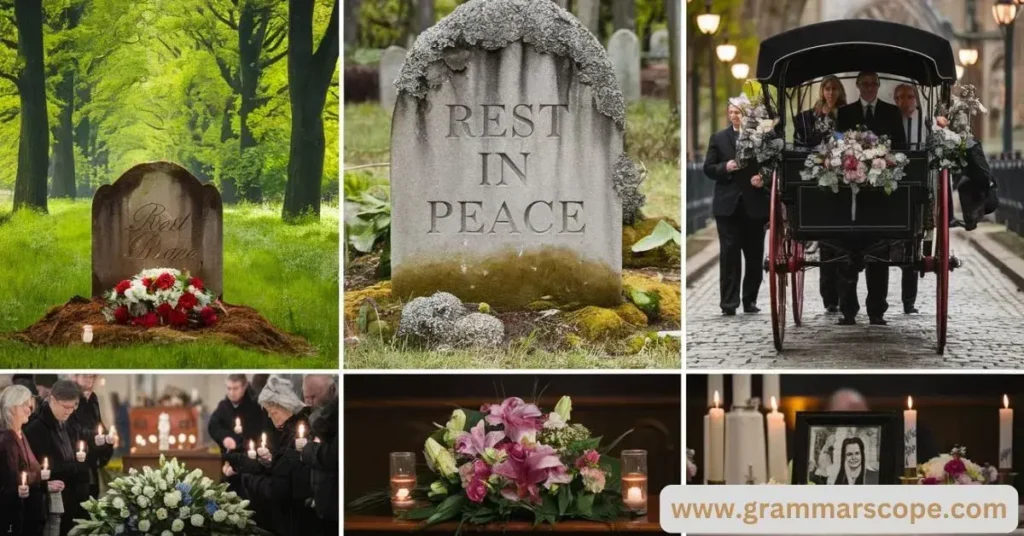When someone you care about loses a loved one, finding the right words to express sympathy can feel challenging. Grief is an intensely personal experience, and words often seem insufficient in offering comfort. That’s where phrases like “Rest in Peace” come in they carry meaning, respect, and a sense of closure. But there are many ways to express condolences, each suited for different relationships and situations.
Whether you’re writing a sympathy message, sending an email, or offering a tribute, knowing the right words can make a world of difference.
In this article, we’ll explore 25 ways to say “Rest in Peace”, each with a scenario example to help you find the best phrase for the situation. From family members to friends, and from mentors to famous personalities, you’ll discover options that range from traditional to more heartfelt expressions. Whether you’re preparing a memorial service speech, writing a condolence message, or offering words at a funeral, this guide will help you navigate the difficult task of expressing your sympathy.
is it Professional to Say: “Rest in Peace”
Saying “Rest in Peace” can be professional, depending on the context. It’s a respectful and widely accepted expression of sympathy, especially in formal situations like memorial services or funeral messages. However, in some professional settings, especially when addressing colleagues or clients, a more neutral phrase, like “My condolences,” may be more appropriate. Always consider the relationship and the tone of the situation before choosing your words.
What to Say Instead of “Rest in Peace” (With Examples)
- Rest in Peace
- May He Rest in Peace
- May She Rest in Peace
- Sleep Peacefully
- Forever in Our Hearts
- Gone but Never Forgotten
- Rest in God’s Arms
- At Peace Now
- In Loving Memory
- May His Soul Rest in Peace
- Peaceful Rest in Heaven
- God’s Peace Be Upon Them
- Heaven Gained an Angel
- Gone to a Better Place
- In Eternal Peace
- May Their Soul Find Peace
- Gone to Rest
- Peaceful Journey Ahead
- Rest Among the Stars
- Embraced by Angels
- May Heaven Shine Light on Them
- Free from Pain
- Forever at Peace
- At Rest, Wrapped in Love
- A Life Well Lived, Now at Peace
25 Professional ways to say “Rest in Peace” (With Examples)
Here are 25 Professional ways to say “Rest in Peace” (With Examples):
1. Rest in Peace

The classic expression “Rest in Peace” is timeless and carries a sense of calm and closure. It’s suitable for a variety of situations, from family members to friends.
Scenario Example (Sympathy Message):
“Dear Mary, I was deeply saddened to hear about John’s passing. May he rest in peace. You’re in my thoughts and prayers during this difficult time.”
2. May He Rest in Peace
This variation of the phrase emphasizes the gender of the deceased, making it more personal. It’s particularly meaningful when referring to a male relative or friend.
Scenario Example (Email):
“Dear David, I’m so sorry for your loss. May he rest in peace, and may you find strength during this tough time.”
3. May She Rest in Peace
When offering condolences for the loss of a female loved one, this phrase offers comfort and respect.
Scenario Example (Sympathy Card):
“Dear Susan, my heart goes out to you. May she rest in peace, and may you find comfort in the cherished memories you shared.”
4. Sleep Peacefully
This expression suggests the peacefulness of sleep, offering a gentle and comforting way to acknowledge someone’s passing.
Scenario Example (Condolence Message):
“Dear Paul, I’m sorry for your loss. May she sleep peacefully, surrounded by love and light.”
5. Forever in Our Hearts
This phrase conveys the idea that the loved one’s memory will live on, making it a heartfelt way to honor someone.
Scenario Example (Email to a Close Friend):
“Dear Claire, losing Tom is such a heavy loss. Forever in our hearts, his spirit will remain with us always.”
6. Gone but Never Forgotten
This is a powerful tribute, especially when you want to emphasize the lasting impact of the deceased person.
Scenario Example (Funeral Speech):
“As we say goodbye, remember that he is gone but never forgotten. His kindness and laughter will live on in all of us.”
7. Rest in God’s Arms

For those with strong religious beliefs, this phrase expresses the comfort of knowing the deceased is now at peace with a higher power.
Scenario Example (Sympathy Message):
“Dear Karen, I pray that he rests in God’s arms now and that you find peace in your faith during this difficult time.”
8. At Peace Now
This phrase reassures the grieving person that their loved one is no longer suffering, which can be especially comforting after a long illness.
Scenario Example (Condolence Message):
“Dear Mark, I’m so sorry for your loss. She is at peace now, free from pain, and forever in your heart.”
9. In Loving Memory
A timeless way to remember someone, this phrase conveys respect and love, making it a suitable option for memorial services and eulogies.
Scenario Example (Memorial Marker):
“In loving memory of William Brooks, who brought joy to all who knew him. His spirit remains with us forever.”
10. May His Soul Rest in Peace
This variation emphasizes the eternal peace of the soul, often used in religious contexts.
Scenario Example (Funeral Service):
“May his soul rest in peace and may all of us carry forward the lessons he taught us.”
11. Peaceful Rest in Heaven
When writing a sympathy message for someone who was deeply religious, this phrase expresses the belief that their loved one has reached eternal peace.
Scenario Example (Sympathy Email):
“Dear Nancy, I’m so sorry for your loss. I hope he finds peaceful rest in heaven, surrounded by love and light.”
12. God’s Peace Be Upon Them

Another religious phrase, this is a comforting way to express condolences, particularly for those who hold strong spiritual beliefs.
Scenario Example (Condolence Card):
“Dear Tom, God’s peace be upon her, and may her memory continue to guide you through these tough times.”
13. Heaven Gained an Angel
This comforting phrase suggests that the deceased person is now in a better place, serving as an angel to those who are still here.
Scenario Example (Memorial Speech):
“Heaven gained an angel when Lucy passed. We’ll miss her, but we know her spirit will be watching over us.”
14. Gone to a Better Place
This phrase is simple but effective, offering the comfort that the deceased has moved on to a place of peace and happiness.
Scenario Example (Funeral Text):
“Dear Lisa, my heart goes out to you. He’s gone to a better place, and may you find peace in knowing he’s no longer suffering.”
15. In Eternal Peace
This phrase emphasizes the permanence of the peace the deceased has found after their passing.
Scenario Example (Sympathy Email):
“Dear Rachel, my thoughts are with you. May he rest in eternal peace, surrounded by the love of those who came before him.”
16. May Their Soul Find Peace
This phrase emphasizes the idea that the soul of the deceased has reached a peaceful resting place, making it a beautiful way to offer comfort.
Scenario Example (Sympathy Text):
“Dear Julie, I am so sorry for your loss. May her soul find peace, and may you find strength in this difficult time.”
17. Gone to Rest
A more subtle way of expressing sympathy, “Gone to rest” suggests that the deceased is now free from any pain or struggle.
Scenario Example (Condolence Email):
“Dear Samantha, I know this is a tough time for you. He has gone to rest now, and I hope you can find comfort in the memories you shared.”
18. Peaceful Journey Ahead

This phrase acknowledges the idea that the deceased has embarked on a peaceful journey after their passing. It’s a comforting thought, especially for those who see death as a transition rather than an end.
Scenario Example (Sympathy Card):
“Dear Anna, my heart breaks for you. I believe she’s on a peaceful journey ahead, surrounded by love and light.”
19. Rest Among the Stars
A poetic and metaphorical way to convey peace, this phrase imagines the deceased being at rest among the stars, offering a sense of grandeur and serenity.
Scenario Example (Funeral Speech):
“As we remember him, let us know he now rests among the stars, forever shining brightly in our hearts.”
20. Embraced by Angels
For a religious sentiment, this phrase invokes the image of angels welcoming the deceased into heaven, offering comfort and hope.
Scenario Example (Sympathy Message):
“Dear Michael, I’m so sorry for your loss. May she be embraced by angels and find peace in their loving arms.”
21. May Heaven Shine Light on Them
This phrase suggests that the deceased is now in heaven, bathed in light and peace. It is particularly soothing for those who are deeply religious.
Scenario Example (Condolence Email):
“Dear Kate, I’m truly sorry for your loss. May heaven shine light on him and bring you peace in this time of grief.”
22. Free from Pain
This simple and comforting phrase highlights the relief from suffering that the deceased now experiences, offering peace to the grieving family.
Scenario Example (Sympathy Card):
“Dear Olivia, I know how much she fought. Now, she is free from pain, and I hope you can find peace in knowing she is at rest.”
23. Forever at Peace
A variation on “Rest in Peace,” this phrase suggests the eternal nature of the peace the deceased has found. It conveys a sense of permanence and calm.
Scenario Example (Memorial Speech):
“As we say goodbye, let us remember that she is forever at peace, resting in a place of eternal serenity.”
24. At Rest, Wrapped in Love
This phrase combines the idea of peace with the comforting notion of love, suggesting that the deceased is at rest and embraced by love from both those here and those who have passed before.
Scenario Example (Sympathy Text):
“Dear Laura, my heart goes out to you. He’s at rest, wrapped in love, and I hope that brings you some peace during this time.”
25. A Life Well Lived, Now at Peace

This phrase celebrates the life of the deceased, acknowledging their journey and the peace they have now found. It’s ideal for someone whose legacy will live on.
Scenario Example (Funeral Tribute):
“He lived a full and meaningful life. A life well lived, now at peace, his spirit will continue to inspire us all.”
Frequently Asked Question
What is a unique way to say “rest in peace”?
A unique way to say “rest in peace” is “Sleep among the stars.” This poetic phrase suggests that the deceased is now part of something vast and beautiful, offering a comforting and celestial imagery. It’s a gentle and creative alternative that can resonate deeply with those seeking a more personal or spiritual expression of peace.
What is a good rest in peace message?
A good rest in peace message is one that feels personal, compassionate, and respectful. Here’s an example:
“I am so sorry for your loss. [Name] was a remarkable person who touched many lives. May their soul find eternal peace, and may you find comfort in the love and memories they leave behind.”
This message acknowledges the impact of the deceased, offers condolences, and wishes peace for both the departed and the grieving family.
What is a good R.I.P. quote?
A good R.I.P. quote is one that reflects the person’s life and the comfort of their passing. Here’s a heartfelt example:
“The ones we love are never truly gone, for they live on in the hearts of those who remember them.”
This quote offers comfort by suggesting that love and memory keep the deceased alive in the hearts of those left behind.
What is a better word than “rip”?
A better or more meaningful alternative to “R.I.P.” (Rest in Peace) could be “Eternal Peace” or “In Loving Memory.” These phrases offer a more personal and respectful tone, emphasizing the lasting peace or the cherished memory of the departed. For example, “May they find eternal peace” or “In loving memory of [Name]” can convey a deeper sense of reverence and affection.
Conclusion
Losing someone you love is never easy, but the right words can offer solace and comfort to those grieving. Whether you choose to say “Rest in peace,” “May he rest in peace,” or one of the many other heartfelt phrases, the important thing is that your message conveys love, respect, and sympathy.
Sympathy messages are a way to show that you’re there for the person in their time of need. The right words can help ease the burden of grief, even if only for a moment, by offering a sense of closure and peace.

Emma Olivia is an experienced blogger and the creative mind behind Grammar Scope. With a passion for language and years of writing expertise, she crafts engaging, informative content that simplifies grammar and writing tips for readers worldwide. Emma’s dedication to clear communication and love for the written word shine through every article she publishes, making Grammar Scope a trusted resource for language enthusiasts and learners alike.






